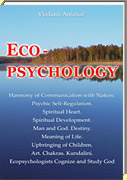New Ecopsychology
|

Published by ISBN: 978-1-8975-1016-2 © Antonov V.V., 2008 Work in the Material WorldIn regard to work, two principles are important for any person, even if he or she is not mature enough to be able to comprehend the highest religious truths. These are — honesty and striving to learn as much as possible. The second principle implies not only aspiration to study but also quite frequent changing of the field of applying one’s efforts and change of places of work. We come to every new place enriched by the experience we gained at all of our previous places of work. This significantly enriches our experience, develops us intellectually, and creates an objective prerequisite for respectful attitude from other people. For religious people, the attitude towards their work implies a more serious approach. Namely, they should regard their social activity as their service to God. This is called Karma Yoga. Karma Yoga is the path of self-development through helping God in His Evolution. This consists in various kinds of help to other people — help in what is really useful for them, including spiritual help. We have to try to serve people with our highest abilities, as well as to aspire to master even higher skills for our service [6,11]. This attitude towards work implies that personal material gain moves far down on the list of our motives, because this kind of service is a way to express our love for God and for people. But is it right to sell love? Krishna said about this: “Regard only the work and not the reward for it!… Miserable are those who act for the sake of getting reward for their activity!” [11] (Bhagavad Gita, 2:47, 49). Karma Yoga does not imply working for free. But Karma Yogis eat “remains of their sacrificial offerings”, as Krishna figuratively put it. [11] (Bhagavad Gita, 3:13). Those who receive help must not forget that the one who helps them also has to pay for food, transport, accommodation, and so on. Let us recall the words of Jesus Christ that relate to this: “Laborers deserve their food” (Matthew, 10:10), “Laborer deserves to be paid” (Luke, 10:7), and important words from the Bhagavad Gita: “The one who receives gifts and gives no gifts in return is verily a thief” [11] (Bhagavad Gita, 3:12). Man develops Love, Wisdom, and Power through constant spiritual quest, which has to be accompanied by service according to the Karma Yoga principles. … We have talked much about Love; now let us talk about Wisdom. Without this quality one cannot achieve Perfection and merge with God. Wisdom is the knowledge of the most essential things: what is God, what is man, what is the meaning of man’s life, and what is the Evolution of the Universal Consciousness. It also implies being familiar with the diversity of human souls, as well as the ability to classify people according to their qualities, faculties, and psychogenetic age. Wisdom consists also in knowing the Straight Path to Perfection and the ways people may diverge from it. Also — knowing how one can help people in their evolution by determining what kind of spiritual help would be most appropriate for them. One acquires Wisdom by performing theoretic research and by gaining practical experience. The former consists in studying the instructions that God has been giving to incarnate people, as well as in getting acquainted with the experience of people who sought for God, their errors and successes. One gains practical knowledge by studying oneself and God, as well as by engaging in spiritual service and creative spiritual work. |